Otto Scharmer’s work is a great inspiration for me and many others. I’m excited to share this interview with him about his work and specifically the book “Leading from the Emerging Future: From Ego-system to Eco-system Economies”. The subtitle explains its great ambition: Applying Theory U to transforming business, society and self. Here’s a framework that can help leaders, consultants, coaches and employees understand how they can make a difference. Ready? Start here!
Marcella Bremer: Why did you write the book Leading from the Emerging Future? How did it evolve?
Otto Scharmer: “I always wanted to write this book. I’ve been part of a variety of change initiatives that started in my youth. The environmental and peace movement in the seventies and eighties in Europe and later on the organizational learning and whole systems thinking movement. In the nineties and two thousands, I did a lot of change projects in business and governments. In spite of successes, sooner or later, we hit against a larger systems boundary, such as Wall Street or the capital market or another boundary.
The current situation in the world could be described as: we are collectively creating results that nobody wants. Think of the environmental problems, the poverty and structural and cultural violence we have created. Given that, the question is: What makes us do that? And what can we do about it? That’s the question I try to explore.”
Marcella Bremer: You’ve been interested in change from an early age, and now you explore change and learning with a scientific approach at the MIT.
Otto Scharmer: “Yes, I joined the MIT Center for Organization Learning that was founded by Peter Senge and his colleagues during the mid-nineties. At the time, all models and methodologies dealing with small and large-scale change were based on the same learning model: reflecting on past experience.
My contribution was to explore a second type of learning: learning from the future as it emerges. If you work with leadership teams in organizations and government, more often than not, people face challenges where applying learning from the past is not good enough. In some cases, the knowledge of the past is preventing the very solution people are seeking. In situations of disruptive change the key capacity that is needed from individuals, teams, organizations, and society is to stop, really pay attention, let go of old definitions of identity, let come of new future possibilities and make a connection to one’s Higher Self – defined as your highest future possibility. In our action learning community at MIT we explore: What does it take to learn from the emerging future?
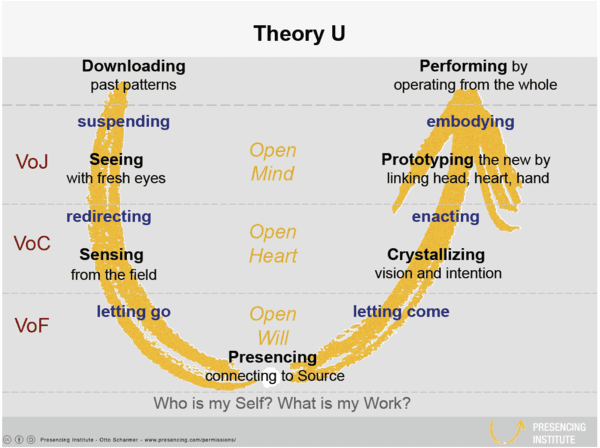 The result is published in three books: Presence (co-authored with Peter Senge, Joseph Jaworski and Betty Sue Flowers), Theory U, and the new book: Leading from the Emerging Future: From Ego-system to Eco-system Economies (co-authored with Katrin Kaufer). We look through the deeper lens of not only the “what” or “how” of change but the “who”: the source of change. We don’t only focus on the micro or mesolevel, but also on the macro and mundo-level: our individual, relational, institutional and global transformation.
The result is published in three books: Presence (co-authored with Peter Senge, Joseph Jaworski and Betty Sue Flowers), Theory U, and the new book: Leading from the Emerging Future: From Ego-system to Eco-system Economies (co-authored with Katrin Kaufer). We look through the deeper lens of not only the “what” or “how” of change but the “who”: the source of change. We don’t only focus on the micro or mesolevel, but also on the macro and mundo-level: our individual, relational, institutional and global transformation.
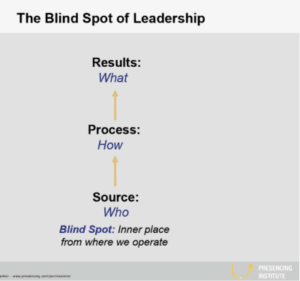 That’s what I believe that we, our generation of change-makers, are called to do. We are almost like a “middle generation”. Before us was the generation that talked about macro and mundo changes but they didn’t put them into practice. Change for them was changing others. After us comes a generation that is very concerned with personal and relational change, and very capable, but less focused on institutional, macro-mundo change…. All these wonderful initiatives of social entrepreneurship around the world almost never go to scale. So, how are they able to transform organizations and larger institutions?
That’s what I believe that we, our generation of change-makers, are called to do. We are almost like a “middle generation”. Before us was the generation that talked about macro and mundo changes but they didn’t put them into practice. Change for them was changing others. After us comes a generation that is very concerned with personal and relational change, and very capable, but less focused on institutional, macro-mundo change…. All these wonderful initiatives of social entrepreneurship around the world almost never go to scale. So, how are they able to transform organizations and larger institutions?
That will only work if it is a cross-generational effort. On the one hand, we must personally embody change, be authentic, reflective and mindful. On the other hand, we must also change the larger institutions. That is the calling of our time and our generation: that’s why we wrote this book.”
Marcella Bremer: That is a real challenge. It’s one thing to apply Theory U for yourself. But organizations are another game. If leaders role-model how to open their mind, heart and will with the Theory U-techniques, maybe they could transform organizations from within?
Otto Scharmer: “Yes, that’s possible, and there are examples. But usually to transform an organization you need to engage the larger eco-system of that organization. That’s our collective challenge of change, learning, and innovation.”
Marcella Bremer: Are industrial leaders or CEOs open to doing this kind of leadership work? Are they willing to look at themselves and turn back the camera to see the source of change: themselves?
Otto Scharmer: “Well…I only see what I see. I’m not aware of the people I don’t meet. My experience is with the participants of our open programs. Many people are interested and engaged. But I also do various projects in organizations, a tech company in an innovation crisis, for instance, or high-potential leaders in a global company. They are not pre-selected based on their interest for transformation or developing more awareness and yet, I am very surprised by their level of openness. Particularly younger and middle-aged leaders until their early fifties are very open to this.
Given my experiences, I am very inspired by how much is possible, from small to medium to global organizations and governments, not only in the West but also in Brazil, Indonesia, India, and China. Maybe we’re not even pushing the envelope enough! There’s a lot more possible than we are trying.”
Marcella Bremer: You were able to accomplish this level of openness, even in a Chinese government organization as you describe in the book. The necessary condition is to create a safe space…
Otto Scharmer: “Yes. Without a safe space, not much is happening in terms of crossing mental thresholds.”
Marcella Bremer: I’ve seen many change projects where most attention was on the “what” of change, but not much attention went to the “how” or the “who.” Such as: how to practice a respectful dialogue and create the collective habit of speaking your mind in a group.
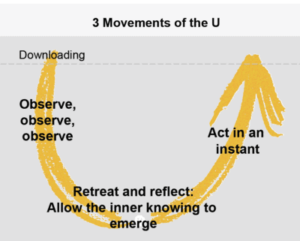 Otto Scharmer: “That’s often not fully appreciated, indeed. Although in professional change management it’s not new: look at Kurt Lewin and Ed Schein. The psychological safety needs to be there as a condition for opening up. That sometimes seems to be forgotten.
Otto Scharmer: “That’s often not fully appreciated, indeed. Although in professional change management it’s not new: look at Kurt Lewin and Ed Schein. The psychological safety needs to be there as a condition for opening up. That sometimes seems to be forgotten.
What I try to spell out in Theory U is that there are various subtle levels of change. The normal ones, and the deeper change levels that involve mindfulness and even spirituality, that in traditional change management have not been included yet.”
Marcella Bremer: One of the great things of Theory U and your new book is that it provides an overview of where you are while learning and changing. You can discern whether you are “level 1 listening” (confirming your prejudice) or in “level 3 dialogue” (seeing yourself from the other’s perspective). Or you’re working in a top-down level 1 organization or a networked, self-organizing level 3 situation.
Otto Scharmer: “That was my intention. Theory U is a framework and language that helps you locate yourself in the larger developmental framework of systems change. It’s a method that helps you move through these phases. It connects us with who we are, with deeper levels. It was my intention to create something that the best practitioners already apply. I’m an action researcher and the biggest compliment I get is when the best practitioners say: “This was not entirely new to me… I just didn’t know that I knew it.”
I wanted to make visible the deeper structure that supports our best moments of leading and learning. We don’t notice it when we are involved in the experience; these subtle movements from one level of listening to another – but this is what happens.
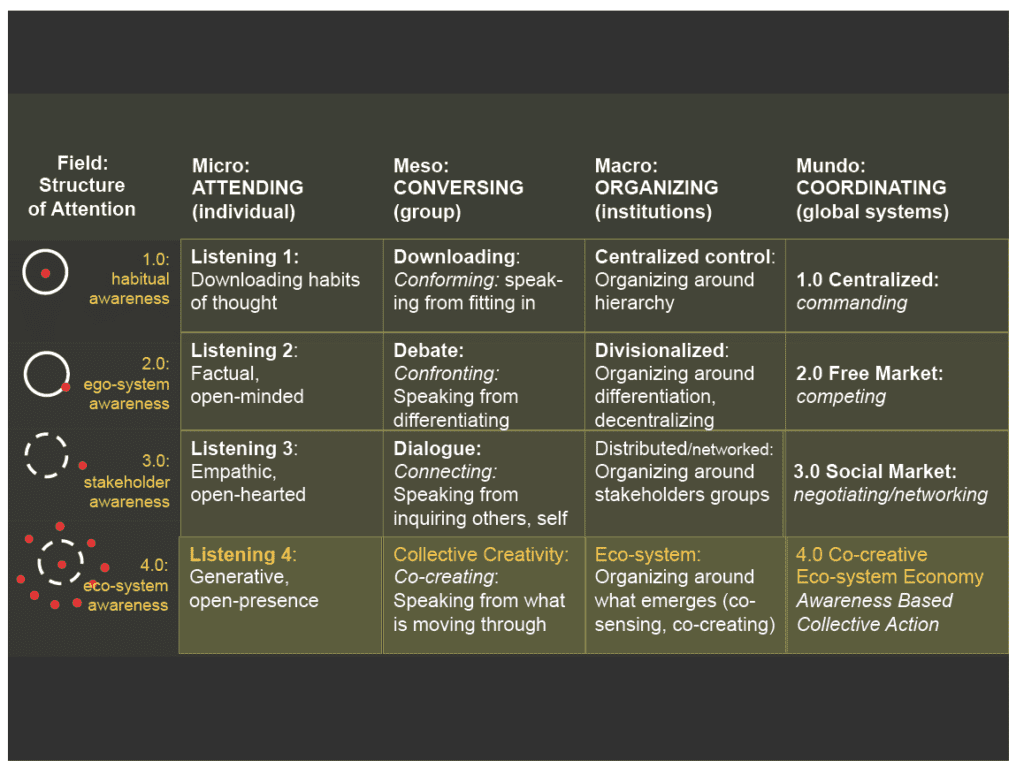 I’m also a practitioner, I do a lot of change projects myself, and like all of us, I integrate a lot of different frameworks and tools. Theory U is a meta-framework that integrates with Appreciative Inquiry, Open Space, World Cafe, Systems Thinking and more tools. That’s important from a practitioner’s point of view.”
I’m also a practitioner, I do a lot of change projects myself, and like all of us, I integrate a lot of different frameworks and tools. Theory U is a meta-framework that integrates with Appreciative Inquiry, Open Space, World Cafe, Systems Thinking and more tools. That’s important from a practitioner’s point of view.”
Marcella Bremer: Yes, that makes it pragmatic and inspiring. In “Leading from the Emerging Future” you go even further. You give a framework that helps to discern the developmental stages of banks, health care organizations, society and more. It provides a map – though every journey is different – of where we could go this 21st Century.
Otto Scharmer: “That’s right. The reason many people feel fatigue about change is that the traditional approaches of change miss two dimensions. The first one is the source or the consciousness dimension, the deeper personal level of change. The second dimension missing is that of the larger societal transformation. The disruptive changes we face are bringing these two missing dimensions more and more into focus.
I believe: as a leader you need to be multi-lingual. The first is the language of the organization, the second is the language of transforming deep structures of consciousness, and the third one is the language of societal transformation. You need to go back and forth between them. If we don’t, we are missing essential information and also connection points with the next generation of employees and customers and stakeholders. That’s what we try to develop in this method.”
Marcella Bremer: If we don’t connect, we will keep the fragmentation. As you say in the book: Institutions and organizations 4.0 are adding the purpose, to see and serve the larger whole
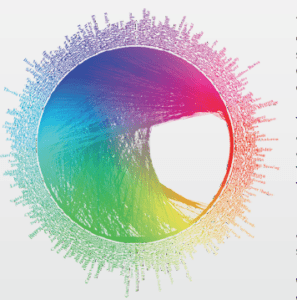 Otto Scharmer: “The current transformation of the economy is toward a co-creative, eco-system economy, where on the level of the whole, with all the stakeholders, we begin to collaborate in a more intentional way. We can keep competition (level 2.0) where it’s useful but also cultivate the collaborative space and cross-institutional collaboration that in many places is underdeveloped today. Collaboration requires a shared intention. So, our task is to build collaborative structures around it. That is a key leverage point to transform our society.”
Otto Scharmer: “The current transformation of the economy is toward a co-creative, eco-system economy, where on the level of the whole, with all the stakeholders, we begin to collaborate in a more intentional way. We can keep competition (level 2.0) where it’s useful but also cultivate the collaborative space and cross-institutional collaboration that in many places is underdeveloped today. Collaboration requires a shared intention. So, our task is to build collaborative structures around it. That is a key leverage point to transform our society.”
Marcella Bremer: What would be three actions that you would like people to do after reading this?
Otto Scharmer: “Here are three possible actions your readers could contemplate: First, form a circle of 5-7 individuals interested in personal and societal change and start meeting regularly using the work and reflection questions and practices at the end of each chapter in the new book. Second, join the online course of U-Lab to learn and connect with others. Lastly, in that context, co-create one specific change initiative that inspires your best energies and commitment.”
How can you make a difference? Buy this book. Read it, organize a coaching circle and practice this. Let’s amplify our positive impact by practicing this kind of change in our organizations, whether you’re a leader, employee, change-maker, coach or other professional.
Read my previous blog post about the book “Leading from the Emerging Future”. What do you think? I look forward to reading your thoughts below this post.
Transforming business, society and self with U-Lab. You can join Otto Scharmer’s online course.
Marcella Bremer is an author and culture & change consultant. She co-founded this blog and ocai-online.com.
4 Responses
This interview helped me a lot I can now get what Theory I is. I’ve been struggling to write an assignment. Thanks a lot guys
You’re welcome! Glad it was helpful.
Marcella
I’m leading change within a church context and have read The Essentials of Theory U book. It is so very helpful, and now I have three more books on order. I’m looking forward to finding a group of 5-7 pastors to work with and see if we can develop a healthier, more comprehensive model of change within the church. Thank you all so much!
Great that Theory U is so useful and inspiring to you! Wishing you the best with change within the church. Keep up the good work 🙂